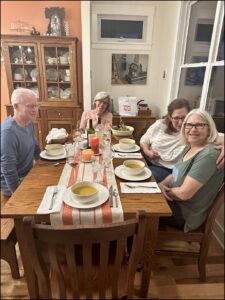May this blog find you in great health with your Medicare Insurance working properly 😊.
Plato hopes you’re enjoying the leaves wherever you are in America. In fact, he double 🐶 dares you to make a pile and jump on it 🍁.
I’ll send a bottle of our honey to the first three people who send selfies in the leaves.
And don’t worry, yellowing Florida palm fronds count 🌴!
The Annual Election Period is in full swing and the phone is ringing.
If you’re happy with your current coverage, and there have been no major changes, then no action is necessary, leave things be 🐝. But…
If you are unhappy, unsure, or just want peace of mind, book a time here. We have till December 7th. Here’s my current list of states:
AL, AZ, CA, CO, CT, FL, GA, ID, IN, IA, KS, LA, MD, MI, MN, MO, NV,
NH, NJ, NY, NC, OH, OK, PA, SC, TN, TX, VA, WA, WI.
Remember: anyone who calls YOU about Medicare without permission is BREAKING THE LAW. Ask for their insurance license number and watch them disappear 👿.
Yours truly had a great time visiting clients, old high school classmates, and family in the Shenandoah Valley. Reconnecting is good for the heart and great for the soul, and it is a reminder we are getting older!
It wasn’t easy to convince my little brother to take an ice bath ❄️ on his farm in late October. The shock is good for the body and the brain, but don’t you try it till you consult a doctor.
I would’ve posted the video, but Haas dropped too many F bombs 😅. That’s what brothers do, right?
Nobody likes feeling older so one of the most important things we can do as we age is to take the time to practice self care, especially of the brain.
A recent study posits that vitamin D deficiencies could be linked to an increased risk of stroke or dementia. And here’s the crazy thing…
Up to 42% of US adults may be deficient in vitamin D!! The good news is there are plenty of easy ways to remedy this problem.
Here are some simple ways to increase vitamin D:
• Spend time in the sun.
• Eat vitamin D-rich foods, fatty fish, eggs, and cheese.
• Take supplements if necessary.
• Include mushrooms in your diet.
Be sure to consult your doctor for personalized advice, but do pick at least one and add it to your life, and let us know if it helps!
68 pounds🍯. That was the honey harvest this year.
Thanks to so many friends for their advice and help in the harvesting and taking care of the bees. I’m keeping my fingers crossed the winter isn’t too hard on them.
Neighbor Erick was kind enough to enough to give me advice about my sprinkler system so I sent him home with honey.
He is an amazing landscape architect who recently completed Seven Stones here in Colorado, a botanical garden cemetery with a whole new approach to celebrate and honor the passing of life. I can’t wait to walk the property. Even better, they have bees!
We lost one of my favorites in Atlanta this month. Miss Shirley was 95, beautiful on the inside and the outside, one of those remarkable people you get the privilege to hear about. Healthy, kind, engaged, and loved. It just doesn’t get any better than that.
Adrienne told me her mom loved seeing her picture in the newsletter. In fact, we’d just been talking about her the week before she passed. Miss Shirley, you’ll be missed. Hope your ears are ringing in heaven.
Stan and Michelle finally pulled off their dream adventure: London, Highclere Castle (from Downton Abbey), Paris, Provence, and Giverny, plus lots of great wine.
Here’s wishing the engineer and his wife continued adventures!
If you ever find yourself a wandering in the Shenandoah, be sure to visit the Thomas House in Dayton, Virginia. Just off Route 11, we’ve been eating there since time out of mind.
Old Mama Thomas has long passed, though some of her china plates still remain on the walls, and the food will bring you back. Digging in to this comfort food reminds me of my days working on Abe Lincoln’s uncle’s dairy farm before school, in the heart of Virginia Mennonite country.
You may need to take a statin and some insulin before grabbing a meat and three plus a glass of sweet tea, but I assure you, it’s worth the indulgence.
Better yet, go with your best friend Luke, his son Lightning Lucas, and a big appetite. You won’t be disappointed.
Leave a good tip and a great smile. The world will thank you.
Good news: Quantz finally came home 🎉! Last stop was Armenia, including a glimpse of Mount Ararat and this Gampr, a huge dog bred to protect flocks from predators (the ears are cropped so the wolves can’t bite them).
73 countries visited, 122 to go! Miles to go before we sleep.
Keep squeezing the juice out of life!
Medicare questions or problems?
Book a time on my calendar or email Gray, Gray@theBig65.com.
If family or friends need help… referrals are the lifeblood of my business.
Let us know what’s going on and please send pictures :).
Karl Bruns-Kyler
(877) 850-0211
Book a time on my calendar here
As a novice to navigating the Medicare system, I cannot recommend the services of Karl enough. His knowledge has saved my wife and I a lot of money, both on the Medicare supplement insurance and the drug coverage. Costs you nothing to listen and has saved up thousands of dollars over time.
– Robert B
Happy with my Service? Click Here to Leave a Review.
Karl Bruns-Kyler is a Medicare insurance broker and independent Medicare agent licensed to help Medicare recipients in twenty-seven states around the country, including:
Alabama
Arizona
California
Colorado
Connecticut
Florida
Georgia
Idaho
Indiana
Iowa
Kansas
Louisiana
Maryland
Michigan
Minnesota
Missouri
Nevada
New Hampshire
New Jersey
New York
North Carolina
Ohio
Oklahoma
Pennsylvania
South Carolina
Tennessee
Texas
Virginia
Washington
Wisconsin
The Big 65 Medicare Insurance Services does not offer every plan available in your area. Currently, we represent 10 organizations that offer 50 products in your area. Please contact Medicare.gov or 1-800-MEDICARE to get information on all of your options.
















